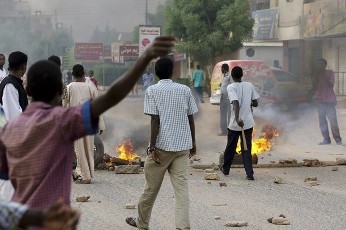Sudan’s protests unabated as government vows no retreat on austerity
June 25, 2012 (KHARTOUM) – Burgeoning demonstrations continued for the tenth day in sporadic parts of Sudan’s capital Khartoum and other provincial towns as the government reaffirmed its intention of going ahead with planned austerity measures.

Over the following days, and as of Friday in particular, the protests widened to reach several parts of the capital as well as key towns, including Al-Obaiyd in north Kordofan State and Kassala in the eastern state, with demonstrators burning tires, blocking roads and chanting slogans calling for the downfall of the regime.
All the while, security forces consisting of police and agents of the National Intelligence and Security Services (NISS) resorted to violence through the use of teargas, batons and sweeping arrests in an attempt to nip the protests in the bud.
President Omer Al-Bashir, addressing student members of his party on Sunday, sought to downplay the growing unrest, dismissing the protesters as few “aliens and bubbles” and threatening to deploy “Muhajhdeen” to crackdown on them.
Sudan Tribune has received reports that large protests erupted on Monday’s morning in the eastern state of Al-Gedaref state and lasted until the evening. Eye witnesses said that the protesters had burned down the headquarters of the ruling National Congress Party (NCP) in Al-Gedarif town but these reports could not be independently verified.
Monday also brought news of mass protests in Al-Obayid and Kosti in the White Nile State with protesters reportedly calling for regime change.
On the same day in Khartoum, police forces fired heavy teargas to break up demonstrations that erupted following a seminar held by the mainstream opposition coalition National Consensus Forces (NCF) at the headquarters of the Popular Congress Party (PCP) in Al-Riyad neighborhood.
The NCF, which includes the PCP of Islamist Hassan Al-Turabi and the National Umma Party (NUP) of former Prime Minister Al-Sadiq al-Mahdi, has vowed to mobilize the streets to oppose the government’s austerity plans.
Also on Monday, protests continued in several parts of Khartoum, including the areas of Buri, Al-Ilafon, Al-Geraif, Abu Ruf in Omdurman and Mayo south of the capital.
Meanwhile, the Sudanese Ministry of Interior issued a press release saying that the police had been monitoring the elements participating in the “rioting” and vowed to deal with them according to the law.
In the same context, the Sudanese minister of finance, Ali Mahmoud, said on Monday that the government will not go back to subsidizing fuel products.
He stressed that the authorities will go ahead with their plans to end fuel subsidies completely now that 30 percent of them had already been lifted.
Mahmoud said that the amendments his ministry introduced into the 2012 budget had completely excluded the possibility of receiving revenues from South Sudan’s oil.
According to the minister, the new austerity measures aims in part at supporting Sudan’s negotiating delegation at the talks with South Sudan in the Ethiopian capital Addis Ababa.
Sudan and South Sudan are currently engaged in talks mediated by the African Union (AU) to resolve a host of post-secession issues including the transit fees for transporting the south’s oil through Khartoum’s pipeline infrastructure.
South Sudan shut down its oil production in January this year after accusing Khartoum of stealing the commodity as it passed through the pipelines.
Mahmoud explained that the reason why they decided to drop the possibility of receiving oil transit fees from the south is that they wanted to free Khartoum’s delegation from negotiating under the pressure that the south’s oil constitutes part of Sudan’s budget since the negotiation process might run for a long time.
In the meantime, NCP’s leading member Mustafa Osman Ismail accused opposition forces on Monday of seeking exploit the current economic situation to bring the regime down.
Addressing the graduation ceremony of 5000 National Service conscripts in Al-Jazzera State, Ismail said that the planned economic reforms would help the country overcome the crisis.
He called for unifying national ranks to surmount the challenges the country was currently facing.
(ST)
